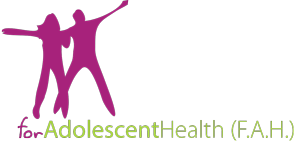Activities Of FAH
1. Clinical activity
FAH supports the clinical work providing holistic health care to adolescents through various collaborations. More specifically FAH is affiliated to theAdolescent Health Unit (A.H.U.)of the Second Dept. of Pediatrics - University of Athens, which is one of the most innovative and important youth health programs in the country. Through this clinical work, FAH addresses the needs of youth 10-19 years of age. Until now, over 30.000 health visits have taken place. It is a model multidisciplinary setting, designed on the basis of World Health Organization (WHO) guidelines on youth friendly services. About 600 adolescents per week visit the A.H.U for several reasons, organic or psychosocial, as well as counselling and preventive services (eg. Vaccination, sexual education, internet use etc.). During the last years of thegreek socioeconomic crisis, there has been a significant increase on mental health demands and reported psychosocial difficulties. Implementing the “holistic” model approach each case-whatever the initial demand is about- is screened for various somatic or psychosocial symptoms.
2. Educational visits at schools
In collaboration with the Greek Ministry of Education (June 2010),the FAH. educational group(psychologist, medical doctor, youth representative) visits over 300 schools per year all over Greece. The educational program is addressed to students, parents and educators and is performed using interactive approach models and specialized material on various adolescent health topics, such as nutrition, sexual education, internet safety, bullying, vaccination, eating disorders, drug use etc. The material is approved by the official Greek Educational Services and is youth friendly with comics, dialogues, interactive scenarios etc
3. Positive activities addressing youth health using online tools
This initiative is sponsored by the Industry (OTE, COSMOTE telecommunication providers). The program is held in the Museum of Telecommunications in Kifissia-Athens and is addressed to all primary schools and first grades of High Schools of Attica. It has an interactive theoretical and an online practical application focusing on positive online activities.
4. “Students educating students - Peer-to-peer” educational approach
Popular youth participating in school councils, are educated in order to provide information and positive influence to peers through interactive and youth friendly initiatives. Qualitative data support a very well received activity that FAH plans to further develop, in collaboration to the AHU-Athens University. Up to now approximately 250 adolescents have been trained and are currently running the program.
5.FAH’s Scientific Collaborators have producedmaterial related to adolescent health issues(books for pre-school children, books for professionals, brochures for primary and high school students, e-learning material for professionals and youth)- all material can be attached and translated if desired.
6.In collaboration with the United Nations (U.N.), FAH offers the“Origami Crane” scholarship, supporting two young adults yearly, in order to participate to the U.N. conflict resolution and peace promotion procedures in Geneva for at least one-month period during spring. The participating youth are expected, after the program to designa communication of knowledge tooland apply it to the public with special focus on youth groups.
7.FAH supports the organization of the annual “State of the Art Adolescent Medicine Course”held by theA.H.U.during spring time. The meeting meets educational needs of health professionals and educators, but there is also participation of youth and parents. International guests are invited and it is now well established and received on our country.
8. Associoeconomic condition in Greece has been a major concern during the past years, FAH providesfree servicesand screening procedures through a multidisciplinary group to the non-insured and below the level of poverty greek population.
9.Youth power: A group of youth helps and supports youngsters in need, with organic-somatic and/or psychosocial difficulties. Activities and voluntary actions are realized as a tool for this initiative.


























